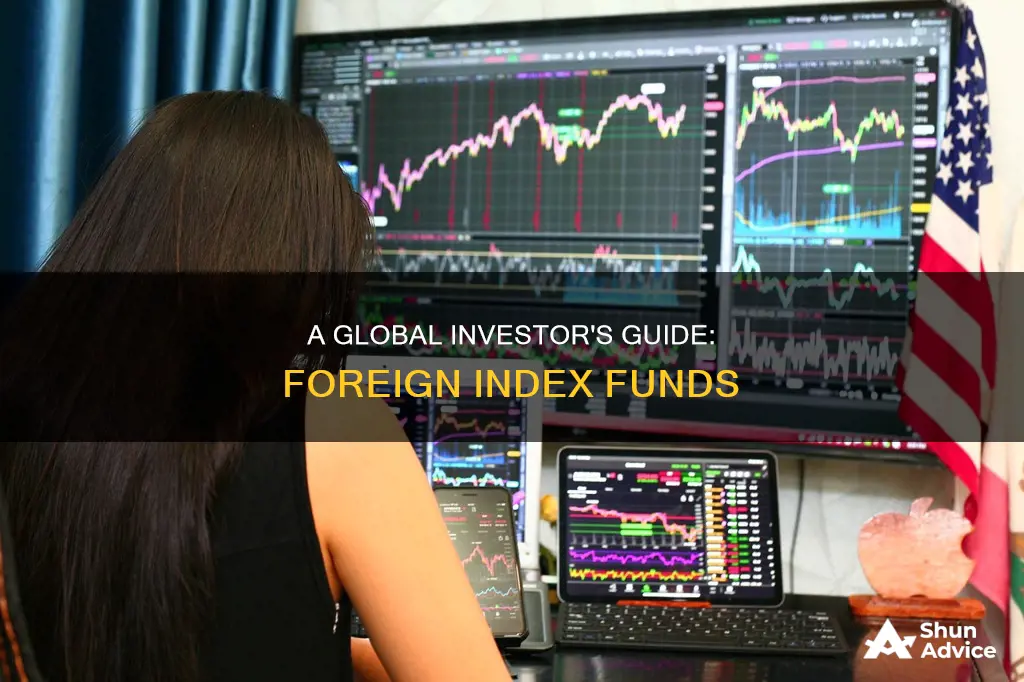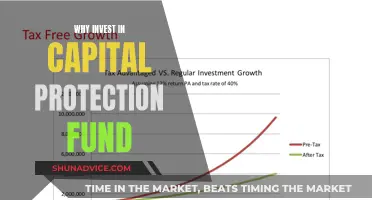
Investing in foreign index funds can be a great way to diversify your portfolio and gain exposure to the growth of other economies. While it can be tricky, with hurdles such as language barriers and currency conversions, there are several ways to invest in foreign markets without too much hassle. The easiest and most common way is to purchase exchange-traded funds (ETFs) or mutual funds that hold a basket of global stocks and bonds. With foreign holdings across multiple industries and countries, these fund types provide a quick and highly diverse foreign component to your portfolio. You can also invest in foreign index funds by buying American Depository Receipts (ADRs), which are U.S.-traded securities that represent ownership in the shares of foreign companies. If you're looking to add an international element to your portfolio, be sure to do your research and understand the risks and benefits involved.
| Characteristics | Values |
|---|---|
| Why invest in foreign index funds? | Diversification and growth |
| Types of foreign index funds | Exchange-Traded Funds (ETFs), Mutual Funds, American Depository Receipts (ADRs), Global Depository Receipts (GDRs) |
| Advantages of foreign stocks | More diversification, buying "foreign" can be a way to buy "value" |
| Disadvantages of foreign stocks | Currency fluctuations, political problems, Pareto problem, higher fees and costs |
| Recommendations for conservative investors | 5% to 10% exposure to foreign stocks |
| Recommendations for aggressive investors | Up to 25% exposure to foreign stocks |
| Risks of international investing | Volatility, inadequate information, currency risk, fraud, less regulation |
| How to invest in foreign markets | Purchase ETFs or mutual funds that hold global stocks and bonds, buy individual foreign stocks through ADRs |
What You'll Learn

Foreign stocks: pros and cons
Investing in foreign stocks can be a great way to diversify your portfolio and gain exposure to the growth of other economies. However, it's important to be aware of the potential risks involved. Here are some of the pros and cons of investing in foreign stocks:
Pros:
- Diversification: Foreign stocks can add diversification to your portfolio, reducing the impact of domestic risks. This is especially beneficial if you invest in countries with economies based on different industries than your home country.
- Market rebound rate: Investing in foreign markets can provide opportunities for higher returns, even during times of crisis. For example, during the Recession of 2008, the US market rebounded faster than the Indian market.
- Exposure to new securities: Foreign markets offer investors access to a wider range of securities. For instance, in the early 2000s, Indian investors were limited to investing in TCS, Infosys, and Wipro, while foreign markets provided access to companies like Apple, Microsoft, and Google.
- Potentially higher returns: Some foreign markets, particularly in developing countries, may offer higher returns due to their faster economic growth rates.
Cons:
- Currency exchange risk: Changes in exchange rates can affect your profits. For example, if the value of your home currency increases relative to the foreign currency, your profits may be reduced when converting them back.
- Double taxation: In some cases, you may be taxed twice on your foreign investment gains—once in the country of investment and again in your home country. However, this can be mitigated by investing in countries with which your home country has a Double Tax Avoidance Agreement.
- Political risk: Political instability in foreign countries can impact your investments negatively. For example, civil unrest, elections, trade agreements, tax changes, and other political events can influence the performance of your investments.
- Lack of regulation: Some foreign markets may have less stringent regulations than your home country, increasing the risk of manipulation or fraud, or inconsistent disclosure and accounting rules.
- Limited information: It can be challenging to access reliable information about foreign companies, especially in emerging markets. This makes it difficult to research and value these companies accurately.
- Volatility: Emerging markets are generally considered riskier due to their higher volatility. They can experience more significant changes in market value, and their growth expectations may not always be met, leading to a loss of investor confidence.
Baillie Gifford Fund: Where Should Your Money Go?
You may want to see also

Foreign stock categories
Foreign stocks can be a great way to diversify your portfolio and gain exposure to the growth of other economies. There are several categories of foreign stocks that you can consider for your investment portfolio:
Developed Markets:
These are the stocks from developed economies such as Europe, Australasia, and the Far East. Countries in this category include the U.K., Japan, France, Switzerland, Germany, Australia, the Netherlands, Italy, Spain, and Sweden. The MSCI EAFE Index is often used as a benchmark for this category, focusing on developed markets outside of North America.
Emerging Markets:
These are the stocks from developing economies worldwide, including countries such as South Korea, South Africa, Taiwan, Brazil, China, Mexico, India, Russia, Israel, and Thailand. These markets may offer higher growth potential but also carry higher risks due to political instability and less regulated markets.
Regional Focus:
You can choose to invest in specific regions, such as Europe, the Asia Pacific region, or Latin America. For example, investing in Europe would give you exposure to some of the largest and most stable economies in the region, such as Germany, France, and the U.K. On the other hand, investing in the Asia Pacific region would provide access to rapidly growing economies like China, South Korea, and India.
Country-Specific:
You can also focus on specific countries that you believe have strong investment potential. For example, investing in Germany would give you exposure to one of the largest and strongest export economies in Europe, with companies like Siemens and Daimler benefiting from a weak euro. Alternatively, you could consider South Korea, which is one of the cheapest markets in the world and has recently seen a turnaround in earnings growth.
Global Excluding US:
This category includes foreign stocks from all over the world, excluding the United States. By investing in this category, you gain exposure to a diverse range of international companies and economies, reducing your dependence on the performance of the US market.
When investing in foreign stocks, it is important to consider the risks, such as currency fluctuations, political instability, and less regulated markets. Additionally, due diligence and research are crucial to understanding the specific characteristics and risks of each category.
Diversified Equity Funds: Smart Investment, Smart Returns
You may want to see also

Foreign stock purchases
American Depository Receipts (ADRs)
ADRs are a convenient way to buy foreign stocks. They are U.S.-traded securities that represent ownership in the shares of foreign companies. ADRs can be traded on major U.S. stock exchanges like the NYSE, NASDAQ, or AMEX, making them easily accessible to U.S. investors. Foreign companies use ADRs to establish a presence in U.S. markets and sometimes to raise capital. There are different levels of ADRs, with varying requirements and capabilities for trading and raising capital.
Global Depository Receipts (GDRs)
GDRs are another type of depository receipt, typically issued by a depository bank. GDRs allow shares of foreign companies to be traded on international markets, mainly in Europe. They are usually denominated in U.S. dollars but can also be in euros or British pounds. GDRs can be found on several major stock exchanges, including London, Luxembourg, Singapore, Frankfurt, and Dubai.
Foreign Direct Investing
Foreign direct investing involves opening a global account with a broker in your home country or a local broker in the target country. This option is suitable for active and serious investors as it involves additional costs, tax implications, currency conversions, and other factors. It is important to be wary of fraudulent brokers not registered with regulators like the SEC in the U.S.
Global Mutual Funds
Global mutual funds provide a hassle-free way to explore international markets. These funds can be actively managed or passive index funds, and they can be region- or country-specific. However, globally focused mutual funds may have higher costs and fees compared to domestic mutual funds.
Exchange-Traded Funds (ETFs)
International ETFs offer a convenient way to access foreign markets. These funds can provide exposure to multiple markets or focus on a single country. Prominent ETF providers include iShares by BlackRock, Vanguard, and Charles Schwab, among others. When investing in international ETFs, it is important to consider costs, fees, liquidity, trading volumes, tax issues, and portfolio holdings.
Multinational Corporations (MNCs)
For investors who are uncomfortable with direct foreign stock purchases, MNCs provide a way to gain international exposure. This involves investing in domestic companies that derive a significant portion of their sales from overseas operations, such as multinational corporations like Coca-Cola or McDonald's. While this approach does not provide true international diversification, it offers a degree of global exposure.
Axis Blue Chip Fund: A Guide to Investing Wisely
You may want to see also

Foreign stock brokers
Global Account Brokers:
These are brokers based in your home country that offer global investment services. Examples include Fidelity, E*TRADE, Charles Schwab, and Interactive Brokers. They provide a convenient way to invest in foreign stocks without having to deal with multiple local brokers. However, investors should be cautious about additional costs, tax implications, currency conversions, and other factors that come with investing in international markets.
Local Brokers in the Target Country:
Opening an account with a local broker in the country where you want to invest is another option for foreign direct investing. For example, the MONEX BOOM trading platform in Hong Kong provides access to the local market as well as 11 other markets. This approach may be more suitable for active and serious investors due to the complexities involved. It is important to be wary of fraudulent brokers and ensure they are registered with the relevant regulators.
Mutual Fund Brokers:
Mutual funds are a popular way to gain exposure to international markets, especially for those who want a simpler and less hands-on approach. Mutual funds can be region-specific or have a global focus, and they can be actively managed or passively track an index. Fees and costs tend to be higher for global mutual funds compared to their domestic counterparts, so it is important to consider these expenses carefully.
Exchange-Traded Fund (ETF) Brokers:
ETFs are a convenient and diverse way to access foreign markets. They can provide exposure to multiple countries and markets or focus on specific regions and sectors. Prominent ETF providers include iShares by BlackRock, Vanguard, Charles Schwab, and many others. When selecting an ETF, investors should consider costs, fees, liquidity, trading volumes, tax implications, and portfolio holdings.
Overall, foreign stock brokers provide investors with a range of options to invest in international markets and diversify their portfolios beyond domestic opportunities. It is important to carefully consider the risks, fees, and complexities associated with each type of broker to make informed investment decisions.
Roth IRA vs. Mutual Funds: Why Choose the Former?
You may want to see also

Foreign stock markets
One of the main advantages of investing in foreign stock markets is diversification. By investing in companies and markets outside of the U.S., investors can spread their risk and potentially reduce the impact of market volatility. This is especially true if investors choose countries with economies based on different industries than the U.S. Foreign stocks can also provide a way to buy "value", as they often sell at lower average P/E ratios than U.S. stocks.
However, there are several risks and challenges associated with investing in foreign stock markets. One of the biggest challenges is currency fluctuations, which can be difficult to predict and can have either positive or negative effects on an investor's wealth. Political instability, particularly in emerging markets, can also impact the performance of foreign stocks. Additionally, foreign markets may be less regulated than U.S. markets, increasing the risk of fraud or manipulation. Language barriers, information access, and varying market operations are other hurdles that investors may face when dealing with foreign stock markets.
Despite these challenges, there are several ways to invest in foreign stock markets. One option is to use American Depository Receipts (ADRs), which are U.S.-traded securities that represent ownership in the shares of foreign companies. ADRs are convenient because they are denominated in U.S. dollars and traded on major U.S. exchanges, eliminating the need for complex currency conversions. However, not all foreign stocks are available as ADRs, and there may be liquidity and voting right issues associated with them.
Another option for investing in foreign stock markets is through Exchange-Traded Funds (ETFs) or mutual funds. These funds provide exposure to multiple foreign markets and countries, offering a highly diverse addition to an investor's portfolio. ETFs and mutual funds can be international, regional, country-specific, or sector-based, allowing investors to choose the level of risk and specialization that aligns with their investment objectives.
For those seeking a more hands-on approach, it is possible to buy foreign stocks directly. This can be done by opening a global account with a broker in your home country or by opening an account with a local broker in the target country. However, this option is generally not suitable for casual investors due to the additional costs, tax implications, and other complexities involved.
In conclusion, investing in foreign stock markets can provide the benefits of diversification and exposure to foreign economies, but it is important to carefully consider the associated risks and challenges. By understanding these factors and conducting thorough research, investors can make informed decisions about investing in foreign markets.
Vanguard Funds: Minimum Investment Requirements and Options
You may want to see also
Frequently asked questions
International investing allows you to spread your investment risk and take advantage of the growth of foreign economies, particularly emerging markets. It also provides diversification as you will own more companies in different industries.
International investing can be more volatile and less regulated than investing in domestic funds. There is also a greater risk of inadequate information, currency fluctuations, and political, economic and social events that are difficult to predict.
You can gain exposure to foreign markets by purchasing exchange-traded funds (ETFs) or mutual funds that hold a basket of global stocks and bonds. You can also buy American Depository Receipts (ADRs), which are U.S.-traded securities that represent ownership in the shares of foreign companies.
Some popular foreign index funds include iShares Core MSCI Emerging Markets (IEMG) and Vanguard FTSE Developed Markets (VEA).







